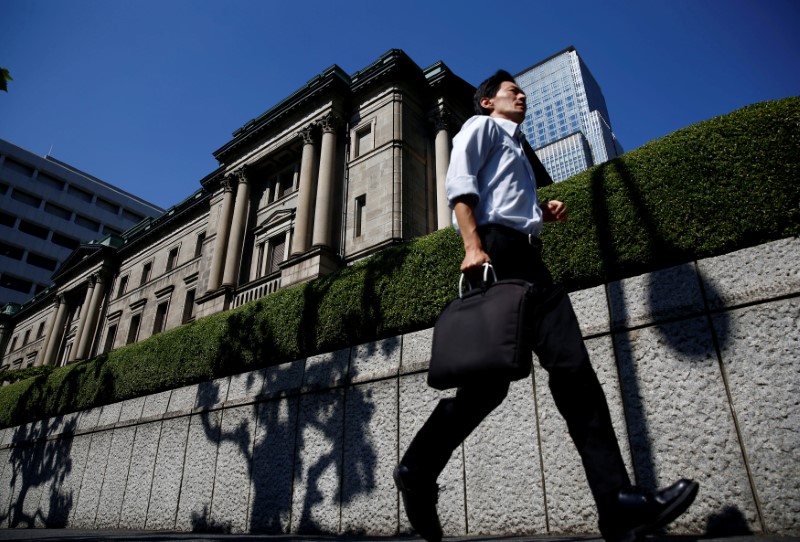 © Reuters. FILE PHOTO – A man runs past the Bank of Japan (BOJ) building in Tokyo
© Reuters. FILE PHOTO – A man runs past the Bank of Japan (BOJ) building in TokyoBy Leika Kihara
TOKYO (Reuters) – Japan’s central bank is set to roughly maintain its price forecasts at its policy meeting next week and blame stagnant inflation on factors like corporate efforts to boost productivity, signaling that it will hold off on expanding stimulus for the time being.
Bank of Japan Governor Haruhiko Kuroda is also likely to stress that the bank is nowhere near dialing back its massive stimulus program, with inflation distant from its 2 percent target.
The rate review comes in the wake of premier Shinzo Abe’s victory in a weekend election, which heightened expectations the BOJ’s ultra-loose policy – a key pillar of his “Abenomics” stimulus policies – will be sustained regardless of who succeeds Kuroda when his term ends next April.
“There’s a strong chance Kuroda will be reappointed, which means the BOJ’s policy framework won’t change much,” said Hiroshi Ugai, chief Japan economist at JPMorgan (NYSE:).
“The BOJ’s next move could be to raise its long-term yield target, but that won’t happen at least until late next year.”
At the two-day meeting ending on Tuesday, the BOJ is set to keep intact a pledge to guide short-term interest rates at minus 0.1 percent and the 10-year bond yield around zero percent.
The market’s focus would be on whether Goushi Kataoka, a board newcomer who voted against keeping policy steady last month, will propose expanding stimulus.
While any such proposal is likely to be voted down by others who see no need to ramp up monetary support amid a strengthening economy, it may expose a fresh rift in the board on the future direction of monetary policy.
STRUCTURAL FACTORS
In a quarterly review of its projections due on Tuesday, the BOJ is seen slightly trimming its inflation forecast for the current year ending in March 2018 from an estimate of 1.1 percent made in July, said sources familiar with its thinking.
The bank is seen roughly maintaining its price forecasts for fiscal 2018 and 2019, as well as its view that inflation will hit its target by March 2020, they said.
The BOJ currently projects inflation to hit 1.5 percent in fiscal 2018, well above a Reuters poll of 0.8 percent, and 1.8 percent the following year.
With the economy in good shape, BOJ officials have recently explained slow inflation as being the result of companies’ efforts to avert wage hikes by automating and streamlining operations.
While such efforts may weigh on prices in the short-term, they would eventually boost inflation and Japan’s long-term growth potential by enhancing productivity, they say.
“We shouldn’t be too negative about the fact wage and inflation growth remains subdued,” BOJ board member Makoto Sakurai said last week, a view Kuroda is likely to echo in his post-meeting news conference.
Japan’s economy expanded at an annualized 2.5 percent in the second quarter as consumer and corporate spending picked up, with steady growth likely to be sustained in coming quarters.
But core consumer prices rose just 0.7 percent in August from a year earlier, well below the BOJ’s target, keeping the bank under pressure to maintain ultra-easy policy even as its U.S. and European peers begin to dial back stimulus.
Fusion Media or anyone involved with Fusion Media will not accept any liability for loss or damage as a result of reliance on the information including data, quotes, charts and buy/sell signals contained within this website. Please be fully informed regarding the risks and costs associated with trading the financial markets, it is one of the riskiest investment forms possible.
Source: Investing.com




























